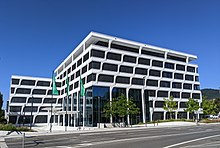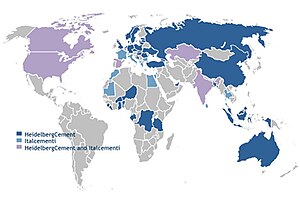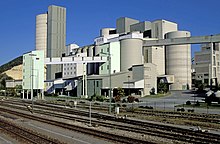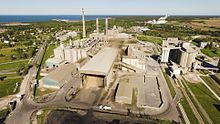Heidelberg Materials
 | |
| Company type | Aktiengesellschaft |
|---|---|
| FWB: HEI DAX component | |
| Industry | Building materials |
| Predecessor | cement industry near Hannover |
| Founded | 1874 |
| Founder | Johann Philipp Schifferdecker |
| Headquarters | Heidelberg, Germany |
Key people | Dr. Dominik von Achten (CEO and chairman of the managing board)[1] Dr. Bernd Scheifele (Chairman of the supervisory board) |
| Products | Cement, aggregates, concrete, asphalt |
| Revenue | |
| Total assets | $41,9bn (2018)[3] |
| Total equity | €18,375mn (2023)[2] |
Number of employees | |
| Website | https://www.heidelbergmaterials.com/en |

Heidelberg Materials is a German multinational building materials company headquartered in Heidelberg, Germany. Formerly known as HeidelbergCement AG, the company has rebranded as Heidelberg Materials in September 2022.[4] It is a DAX corporation and stands as one of the world's largest building materials companies. On 1 July 2016, HeidelbergCement AG completed the acquisition of a 45% shareholding in Italcementi. This acquisition made HeidelbergCement the number one producer of construction aggregates, the second-largest in cement and the third-largest in ready-mixed concrete worldwide. In the 2020 Forbes Global 2000, HeidelbergCement was ranked as the 678th -largest public company in the world.[5]
The enlarged group has activities in over 50 countries with 51,000 employees working at almost 3,000 production sites. Heidelberg Materials operates around 130 cement plants with an annual cement capacity of around 170 million tonnes, around 1,300 ready-mixed concrete production sites, and just under 600 aggregates quarries.[2]
History
[edit]
The company was founded on 5 June 1874 by Johann Philipp Schifferdecker, at Heidelberg, Baden-Württemberg, Germany. It was making 80,000 tonnes per annum of Portland cement in 1896. It acquired numerous other small companies from 1914 onwards, and by 1936, it was making one million tonnes per annum.
Following the Nazi seizure of power in 1933, the cement industry profited massively from state-run construction and armaments projects, leading to a generally positive view of the policies of the Reich government among workers and management of the company.[6] The company's general director Otto Heuer had joined the NSDAP on 1 May 1933, and was a member of the Freundeskreis Reichsführer SS.[7] During the Second World War, the cement industry was classified as essential to the war effort and initially experienced only minor restrictions in production. As the war progressed, prisoners of war and forced labourers were used in numerous plants; according to the company, the number of people affected is estimated at 1,000.[8]
Activities abroad began with the acquisition of part of Vicat Cement, France. Shipments reached 8.3 million tonnes in 1972. In 1977, a massive program of purchases in North America began with the acquisition of Lehigh Cement. In 1990, expansion in eastern Europe began.
In 1993, it acquired part of SA Cimenteries CBR of Belgium, which already had a major multinational operation. Since then, it has continued to expand, with complete buy out of CBR, and purchases in eastern Europe and Asia. A major step was the acquisition of Scancem in 1999, with operations in Northern Europe as well as Africa. Indocement in Indonesia was included in 2001.
In May 2007, the British company Hanson was acquired, a transaction worth £7.85 billion (US$15.8 billion), which gave the company a stronger market position in the United Kingdom and the United States, and turned HeidelbergCement into the world's leading producer of aggregates.

HeidelbergCement has (2010) 29 cement and grinding plants in Western and Northern Europe, 19 in Eastern Europe and Central Asia, 16 cement plants in North America, and 14 in Africa and the Mediterranean Basin. The company sold Maxit Group and its 35% share in Vicat Cement to help finance its acquisition of Hanson plc in August 2007. In most of the group's European countries, HeidelbergCement is the market leader in the cement business.
Adolf Merckle was a big investor in HeidelbergCement.[9] A capital increase in HeidelbergCement in September 2009, combined with a selling of shares from the Merckle family, opened up for other international owners and higher trading volumes on the stock exchanges.[citation needed] In August 2006, HeidelbergCement AG entered the Indian cement market with the acquisition of Mysore Cement.[10]
In 2013, the cement company CJSC Construction Materials based in the Russian Republic of Bashkortostan was acquired.[11]

On 1 July 2016, HeidelbergCement AG completed the acquisition of a 45% shareholding in Italcementi S.p.A.[12][13] With the acquisition, HeidelbergCement became the number one producer of aggregates, the number two in cement and number three in ready mixed concrete worldwide. The company agreed to sell its assets in the United States for $660 million to Cementos Argos to fulfil anti-trust requirements for the takeover.[14]
The Heidelberg headquarters on Berliner Strasse, built in 1963, were demolished in 2017 and a larger new building was built on the same site by 2020 for around 100 million euros.[15]
Heidelberg has entered new important markets, including France and Italy in Europe, Egypt and Morocco in North Africa and Thailand in Southeast Asia. In Canada, India and Kazakhstan, the takeover further strengthens the existing market presence of HeidelbergCement.[16] The enlarged group is active in around sixty countries, with 60,000 employees working at 3,000 production sites. Heidelberg Materials operates around 130 cement plants with an annual cement capacity of around 170 million tonnes, around 1,300 ready-mixed concrete production sites, and just under 600 aggregates quarries.[16]
The company worldwide
[edit]Heidelberg Materials Global Corporate Headquarters are located in Heidelberg, Germany.
The company operates in over 50 countries/territories around the world including:
Structures operating in Russia
[edit]- Cement factory,[17] Sterlitamak
- Cement factory "CESLA",[18] Slantsy, Leningrad Oblast
- Cement factory,[19] Novogurovsky
Controversial activities and criticism
[edit]Climate change
[edit]As cement manufacturing is an extremely CO₂ intensive process, the cement industry is one of the main contributors to climate change, being responsible for a significant amount of global emissions.[20] Of all companies traded on the DAX, Heidelberg Materials was the second largest CO₂-emitter.[21] For this reason, there have already been numerous protests by environmental groups, like Fridays For Future,[22] Extinction Rebellion[23] and Greenpeace.[24] In August 2020, the local group "Wurzeln im Beton" ("Roots in Concrete") blocked the main entrance to the company's headquarters[25] and in May 2021, its cement plant near Heidelberg was blocked by the local Extinction Rebellion chapter.[26]
By 2024, despite reduction of the DAX total, and Heidelberg's emissions in particular, Heidelberg was the largest emitter in the DAX,[27] cement manufacture emissions being particularly difficult to reduce. Nevertheless Heidelberg still plans to be net zero by 2030, and expects its first under-construction carbon capture, usage and storage facility to come online in 2025.[28]
| Year | Emissions (in million tons) |
|---|---|
| 1990 | 83.2 |
| 2017 | 73.8 |
| 2018 | 75.7 |
| 2019 | 72.6 |
| 2020 | 67.9 |
| 2021 | 69.0 |
Indonesia
[edit]Heidelberg Materials has been heavily involved in the planned construction of a controversial cement plant on the Indonesian island of Java through its subsidiary "Indocement". The objective is the exploitation of the Kendeng mountains against the resistance of the people living there.
In addition to the destruction of the complex ecological system, the construction also has created the marginalization of partially indigenous living inhabitants of the region to follow.[31] In this region, the indigenous known as Sedulur Kendeng are protesting against the planned mining operation of PT Semen Indonesia, a state owned enterprise. In March 2017, 50 protestors poured concrete over their feet in front of the Presidential Palace in Jakarta. This is the second time this has occurred in eleven months.[32]
In addition to the protest against the factory building and its ecological consequences as "misconceived 'development' at the expense of indigenous and peasants", the activists also appealed politically at Heidelberg Materials that a multinational "company should not invest in environmental destruction and human rights violations, in any country in the world."[33]
In September 2020, representatives of the local communities submitted a complaint to the German government.[34] It alleges Heidelberg Materials' plans in the Kendeng mountains to threaten their livelihoods, water resources and the local ecosystem as well as sites sacred to local Indigenous Samin communities. As a member of the Organisation for Economic Co-operation and Development (OECD), Germany maintains a National Contact Point that addresses complaints against German companies for overseas violations of the OECD Guidelines on Multinational Enterprises.[35] The guidelines contain standards on human rights and the environment.[36]
West Bank
[edit]In Israeli occupied West Bank Heidelberg Materials' wholly owned subsidiary Hanson Israel manufactures ready-made cement, aggregates and asphalt for Israel's construction industry. In March 2009, the Israeli human rights organization Yesh Din filed a petition with the Israeli high court demanding a halt to mining activity in West Bank quarries, including Hanson Israel's Nahal Raba quarry.[37][38]
According to research of the ARD magazine "Panorama" on 2 September 2010, and the ARD Studios Tel Aviv, the minerals produced are brought to Israel without any benefit to the Palestinian communities.[39] Palestinians from the village of az-Zawiya in the immediate vicinity of the quarry lay claim to the land. The Israeli Supreme Court rejected the petition from Yesh Din in December 2011.
Divestment
[edit]In September the largest Danish pension fund, PFA Pension(Da), divested from Heidelberg Materials due to "Violation of basic human rights, which conflicts with UN Global Compact principles 1 and 2."[40]
In October 2017, Danish pension firm Sampension added Heidelberg Cement to its blacklist, because it operates an asphalt factory and quarry in the West Bank.[41]
US
[edit]In California, after 80 years of operations and more than 2,000 violations over a 10-year period the part Heidelberg-owned[citation needed] Leigh Cement factory and quarry announced in 2023 that it would shutdown.[42] According to ABC7, the environmental advocacy non-profit Green Foothills claimed that the cement plant was the worst source of air pollution in the county of Santa Clara.[42]
Wales
[edit]In March 2024, residents of Glyncoch, near Pontypridd in South Wales, engaged in a series of protests around the over-riding of the local authority's opposition to extend quarrying, by the Minister of Climate Change, Julie James. This successful appeal will allow a further 15.7 million tonnes of rock to be extracted for road surfacing and runways. The quarry operations will continue until 2047 and will come within 164 meters of schools and housing as well as destroying a community green space and a wildlife sanctuary.[43]
See also
[edit]List of companies traded on the DAX Main Heidelberg Materials competitors are:
References
[edit]- ^ Beumelburg, Christoph. "Dr. Dominik von Achten becomes the new Chairman of the Managing Board of HeidelbergCement". HeidelbergCement. Retrieved 22 February 2020.
- ^ a b c d e f "Annual and Sustainability Report 2023" (PDF). 9 September 2024. Retrieved 9 September 2024.
- ^ "HeidelbergCement | Company Overview & News". Forbes.
- ^ "HeidelbergCement becomes Heidelberg Materials". Heidelberg Materials Group. 20 September 2022. Retrieved 21 August 2023.
- ^ "Forbes Global 2000". Forbes. Retrieved 31 October 2020.
- ^ Cramer, Dietmar (2013). "Die Geschichte von HeidelbergCement. Der Weg des süddeutschen Unternehmens zum internationalen Konzern" (PDF) (in German). p. 94. Retrieved 6 April 2020.
- ^ "Statistisch-wissenschaftliches Institut des Reichsführers SS: Angehörige des Freundeskreises des Reichsführers-SS" (in German). Archived from the original on 27 September 2007. Retrieved 6 April 2020.
- ^ Cramer, Dietmar (2013). "Die Geschichte von HeidelbergCement. Der Weg des süddeutschen Unternehmens zum internationalen Konzern" (PDF) (in German). p. 101. Retrieved 6 April 2020.
- ^ Adolf Merckle Archived 2011-02-24 at the Wayback Machine on Forbes.com
- ^ "HeidelbergCement India CEO Ashish Guha quits". Times of India. 2 May 2014.
- ^ "Beteiligung bei CJSC erhöht - Zement Kalk Gips". www.zkg.de (in German). Retrieved 19 January 2023.
- ^ "HeidelbergCement schließt Erwerb von 45%-Anteil an Italcementi ab". Heidelberg Materials.
- ^ "Ad hoc: HeidelbergCement AG erwirbt 45 % der Aktien an der Italcementi S.p.A." Heidelberg Materials.
- ^ "HeidelbergCement sells U.S. assets for $660 million". Reuters. 18 August 2016. Retrieved 18 August 2016.
- ^ "Heidelberg: Umzug bei HeidelbergCement beginnt Ende Mai". Rhein-Neckar-Zeitung (in German). Retrieved 19 January 2023.
- ^ a b "Annual and Sustainability Report 2023" (PDF). Heidelberg Materials. 9 September 2024. Retrieved 9 September 2024.
- ^ "Цементный завод в Стерлитамаке". www.heidelbergcement.ru.
- ^ "Цементный завод "ЦЕСЛА"". www.heidelbergcement.ru.
- ^ "Цементный завод в Новогуровском". www.heidelbergcement.ru.
- ^ Andrew, Robbie M. (26 January 2018). "Global CO2 emissions from cement production" (PDF). Archived from the original (PDF) on 21 July 2018.
We show that global process emissions in 2016 were 1.45 ± 0.20 GtCO₂, equivalent to about 4 % of emissions from fossil fuels
- ^ "Klimabilanz: Rückschlag fürs Klima: CO2-Bilanz der Dax-Konzerne verschlechtert sich – vor allem bei einem". www.handelsblatt.com (in German). Retrieved 11 August 2022.
- ^ ""Make Love - not Cement": "Fridays for Future" nehmen HeidelbergCement ins Visier". Rhein-Neckar-Zeitung (in German). Retrieved 11 August 2022.
- ^ "Kritik an Zementfirma - Heidelberg - Nachrichten und Informationen". www.mannheimer-morgen.de (in German). 3 June 2020. Retrieved 11 August 2022.
- ^ "Warum die Klima-Aktivisten gegen HeidelbergCement protestieren - Firmen in der Region". www.mannheimer-morgen.de (in German). 6 May 2021. Retrieved 11 August 2022.
- ^ "Heidelberg: Klimaaktivisten protestieren an Zentrale von Heidelberg Cement (Update, plus Fotogalerie)". Rhein-Neckar-Zeitung (in German). Retrieved 11 August 2022.
- ^ Zeitung, Süddeutsche (5 May 2021). "Umweltaktivisten blockieren Zufahrt von HeidelbergCement". Süddeutsche.de (in German). Retrieved 11 August 2022.
- ^ https://www.marketscreener.com/quote/index/DAX-7395/news/Analysis-DAX-companies-reduce-greenhouse-gas-emissions-47667787/
- ^ 2023 report
- ^ "Sustainability Report". HeidelbergCement Group. Retrieved 11 August 2022.
- ^ "Nachhaltigkeitsbericht". HeidelbergCement Group (in German). Retrieved 11 August 2022.
- ^ Tempo.Co- (16 May 2016). "Warga Kendeng Tolak Pabrik Semen di Depan Kantor Kedutaan Jerman | lingkungan | tempo.co" (in German). Retrieved 28 June 2016.
- ^ "Kendeng Against Cement". MR online. 27 March 2017. Retrieved 2 May 2017.
- ^ "News - Berlin: Solidarität mit Kendeng gegen HeidelbergCement - Rettet den Regenwald e.V." www.regenwald.org (in German). Archived from the original on 26 August 2016. Retrieved 28 June 2016.
- ^ "Archived copy" (PDF). Archived from the original (PDF) on 19 September 2020. Retrieved 14 September 2020.
{{cite web}}: CS1 maint: archived copy as title (link) - ^ "Nationale Kontaktstelle für die OECD-Leitsätze (NKS)".
- ^ Klawitter, Nils (9 September 2020). "OECD-Beschwerde: Indonesische Landarbeiter klagen gegen deutschen Zementgiganten". Der Spiegel.
- ^ Request by Yesh Din to the Supreme Court in Israel. Archived 2016-03-07 at the Wayback Machine (English)
- ^ HeidelbergCement Archived 2018-08-28 at the Wayback Machine, whoprofits.org
- ^ Deutsches Investment: Raubbau im Palästinensergebiet Archived 2016-03-13 at the Wayback Machine, ARD-Magazin Panorama, 2. September 2010 (German)
- ^ Responsible investment Archived 2017-09-21 at the Wayback Machine, PFA pensions
- ^ Max Schindler (13 October 2017). "Danish pension fund bans four firms over West Bank settlement activity". Jerusalem Post.Archived 2017-10-13 at the Wayback Machine
- ^ a b "Lehigh Cement Plant in South Bay closes permanently after decade's worth of violations". ABC7 San Francisco. 18 August 2023. Retrieved 28 March 2024.
- ^ "Pontypridd: Glyncoch protest over Craig-yr-Hesg quarry expansion". www.bbc.com. Retrieved 26 March 2024.
External links
[edit]- Official website
- Documents and clippings about Heidelberg Materials in the 20th Century Press Archives of the ZBW
